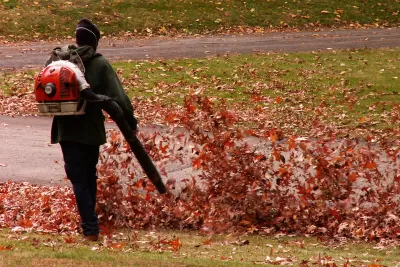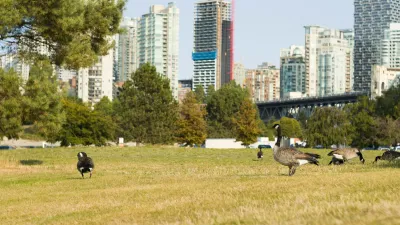Electric and battery-powered leaf blowers have a reduced impact on pollution and human health, but our lawn care practices continue to harm plant and animal habitats.

Dubbing them "mechanical locusts"––with apologies to locusts––that fill the air "with the stench of gasoline and death," Margaret Renkl argues for the abolition of gasoline-powered leafblowers, "the most maddening of all the maddening, environment-destroying tools of the American lawn-care industry."
With their outdated two-stroke engines, leaf blowers emit a massive amount of pollutants like carbon monoxide, smog-forming nitrous oxides, and carcinogenic hydrocarbons. "A 2011 study by Edmunds found that a two-stroke gasoline-powered leaf blower spewed out more pollution than a 6,200-pound Ford F-150 SVT Raptor pickup truck." Aside from pollutants, leaf blowers also emit noise "at levels that can cause tinnitus and hearing loss with long exposure," Renkl writes.
"This month, Gov. Gavin Newsom of California signed a new law making his the first state with plans to ban gas-powered lawn equipment along with other machines, like generators and pressure washers, that use gasoline-powered engines." Around the country, more than 100 cities have passed their own regulations prohibiting gas-powered leaf blowers, and the market share for electric and battery-operated tools is growing rapidly.
But even clean, quiet leaf blowers take a toll on biodiversity, says Renkl. "Leaf blowers, whether electric or gasoline-powered, dislodge the leaf litter that is so essential to insect life — the insect life that in turn is so essential to birds and other wildlife." To protect local ecosystems and biodiversity, Renkl notes, we should leave the leaves alone.
FULL STORY: The First Thing We Do, Let’s Kill All the Leaf Blowers

Maui's Vacation Rental Debate Turns Ugly
Verbal attacks, misinformation campaigns and fistfights plague a high-stakes debate to convert thousands of vacation rentals into long-term housing.

Planetizen Federal Action Tracker
A weekly monitor of how Trump’s orders and actions are impacting planners and planning in America.

Chicago’s Ghost Rails
Just beneath the surface of the modern city lie the remnants of its expansive early 20th-century streetcar system.

Bend, Oregon Zoning Reforms Prioritize Small-Scale Housing
The city altered its zoning code to allow multi-family housing and eliminated parking mandates citywide.

Amtrak Cutting Jobs, Funding to High-Speed Rail
The agency plans to cut 10 percent of its workforce and has confirmed it will not fund new high-speed rail projects.

LA Denies Basic Services to Unhoused Residents
The city has repeatedly failed to respond to requests for trash pickup at encampment sites, and eliminated a program that provided mobile showers and toilets.
Urban Design for Planners 1: Software Tools
This six-course series explores essential urban design concepts using open source software and equips planners with the tools they need to participate fully in the urban design process.
Planning for Universal Design
Learn the tools for implementing Universal Design in planning regulations.
planning NEXT
Appalachian Highlands Housing Partners
Mpact (founded as Rail~Volution)
City of Camden Redevelopment Agency
City of Astoria
City of Portland
City of Laramie





























